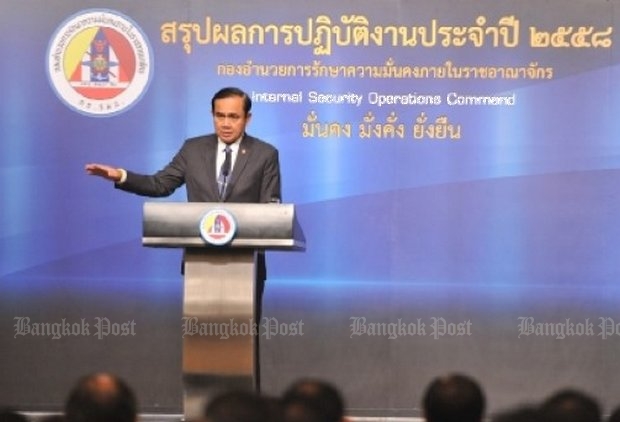
Prime Minister Prayut Chan-o-cha wants the Internal Security Operations Command (Isoc) to undergo a restructuring and incorporate the Southern Border Provinces Administrative Centre (SBPAC) into its new structure.
Gen Prayut, also director of Isoc, said making the SBPAC part of Isoc should lead to greater efficiency.
The SBPAC is an integrated military-police-civilian organisation which oversees projects aimed at improving quality of life in the deep South.
Gen Prayut was speaking at a meeting held Wednesday at Government House in which Isoc presented its achievements in the past year and outlined its operations plan for this year.
"Rumour has it that the military wanted to control everything. That's untrue. No one will control anyone but these two organisations will have to come along," said Gen Prayut.
"Isoc is not a tool for any side to abuse, nor is it mine," he said, adding that Isoc serves the public and its scope of work isn't limited to the three southern provinces.
Deputy Prime Minister Prawit Wongsuwon, who is in charge of the government's security affairs, said an amendment to the SBPAC law is needed to allow the merger with Isoc.
The merger should help improve unity and integration of their work, said Gen Prawit.
An army source said the merger was an idea Gen Prayut had considered since his time as army chief.
Gen Prayut proposed the merger because he found it uncomfortable to deal with the SBPAC, then headed by Pol Col Tawee Sodsong, said the source.
Gen Prayut, at the time, was frustrated at Isoc's inability to give commands to the SBPAC. The source also added that Gen Prayut was bothered by the fact the SBPAC tended to focus its resources on political issues.
Immediately after Gen Prayut became prime minister following the 2014 coup, he pushed for the restructuring of Isoc, said the source.
Gen Prayut assigned Gen Chatchaloem Chaloemsuk, then Isoc secretary-general and army chief of staff, to lead the restructuring.
The assignment has since been passed on to Gen Pisit Sithisarn, the new army chief of staff and Isoc secretary-general.
Initially, the army and Isoc wanted to dissolve the SBPAC through the merger and appoint the SBPAC's secretary-general as an adviser to the Isoc director, the source said.
"But because it was feared that the [southern] unrest would flare up if the SBPAC was dissolved as that had happened in the past, the plan was instead changed so the SBPAC will be included as a part of Isoc to cushion resistance by those who may be unhappy with the merger," said the source.
The SBPAC now has 199 staff members and was given a budget of 2.7 billion baht last year and 3.7 billion baht this year, said the source, adding that Gen Prayut wants Isoc and the SBPAC to work together and manage their budgets together.
An SBPAC source admitted that the SBPAC really had been abused as a political tool.
SBPAC secretary-general Panu Uthairat said he was willing to follow Gen Prayut's policy because he believes the inclusion of the SBPAC into Isoc would help improve the work performance of the SBPAC.
Gen Pisit affirmed that the SBPAC would not be dissolved.
Instead the organisation would become a division within Isoc, saying the main reason for the change was to improve the consistency of the work of both Isoc and the SBPAC.
The SBPAC will then become an adviser to the Isoc director, which in this case is Gen Prayut, he said.
Justice Minister Paiboon Koomchaya insisted that Isoc's roles do not overlap with those of the government as Isoc adopts the government's policy as a guideline for its own work.
